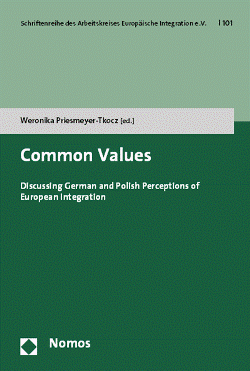New publiction by Adam Kirpsza, PhD, published in a worldwide-recognized publisher Nomos

We are pleased to inform that a new publication by Adam Kirpsza, PhD, from the JMC EURCRIS team etitled “Together or separately? Explaining voting cohesion between the Polish and German Members of the European Parliament” has been published in a worldwide-recognized publisher Nomos. The publication is one of the chapters in a book “Common Values. Discussing German and Polish Perceptions of European Integration”, edited by Weronika Priesmeyer-Tkocz.
Abstract
The article seeks to answer the following question: what factors cause that Polish and German MEPs vote together or separately in the European Parliament? The aim is to identify the main reasons and areas of compliance and discrepancies among these countries during the voting in this institution. For this reason, several hypotheses were delineated and tested statistically using a fractional logit on a dataset containing 1982 votes during the seventh EP term (2009-2014). The analysis has showed that the voting cohesion between Polish and German MEPs is higher when: 1) the rapporteur is from one of these countries and at the same time belongs to one of the two largest political groups - EPP or S&D; 2) a higher majority is required to adopt legislative act; 3) the vote is concerned with proposals related to foreign affairs, agriculture, development, internal market as well as legal affairs. On the other hand, the Polish and German MEPs are less likely to vote together when: 1) a salient proposal is voted; 2) the rapporteur is a member of the EPP and is not a Pole or German; 3) the voting attendance rate of the Polish and German MEPs is high; 4) the voted proposal is concerned with environment, health and food security; women’s rights and gender equality; international trade; industry, energy and research; civil liberties, justice and home affairs; constitutional affairs, as well as regional policy. The analysis has also showed that Polish and German MEPs are not socialized and their cooperation needs improvement.
Published by: Michał Dulak

